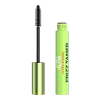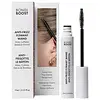What's inside
What's inside
 Key Ingredients
Key Ingredients

 Benefits
Benefits

 Concerns
Concerns

 Ingredients Side-by-side
Ingredients Side-by-side

Water
Skin ConditioningTriethanolamine
BufferingCarbomer
Emulsion StabilisingPhenoxyethanol
PreservativePolyacrylate-2 Crosspolymer
PEG-40 Hydrogenated Castor Oil
EmulsifyingCaprylyl Glycol
EmollientEthylhexylglycerin
Skin ConditioningParfum
MaskingArgania Spinosa Kernel Oil
EmollientSodium Lauryl Sulfate
CleansingHexyl Cinnamal
PerfumingBenzyl Alcohol
PerfumingLinalool
PerfumingHydrolyzed Wheat Protein
Skin ConditioningAmyl Cinnamal
PerfumingHydrolyzed Corn Protein
Skin ConditioningHydrolyzed Soy Protein
HumectantTocopherol
AntioxidantWater, Triethanolamine, Carbomer, Phenoxyethanol, Polyacrylate-2 Crosspolymer, PEG-40 Hydrogenated Castor Oil, Caprylyl Glycol, Ethylhexylglycerin, Parfum, Argania Spinosa Kernel Oil, Sodium Lauryl Sulfate, Hexyl Cinnamal, Benzyl Alcohol, Linalool, Hydrolyzed Wheat Protein, Amyl Cinnamal, Hydrolyzed Corn Protein, Hydrolyzed Soy Protein, Tocopherol
Aloe Barbadensis Leaf Juice
Skin ConditioningWater
Skin ConditioningIsopentyldiol
HumectantPropylene Glycol
HumectantGlycerin
HumectantPropanediol
SolventVp/Va Copolymer
Caffeine
Skin ConditioningHydroxypropyl Guar Hydroxypropyltrimonium Chloride
Benzyl Alcohol
PerfumingVp/Methacrylamide/Vinyl Imidazole Copolymer
Polyglyceryl-10 Diisostearate
EmulsifyingLactic Acid
BufferingCellulose Gum
Emulsion StabilisingSodium Benzoate
MaskingPotassium Sorbate
PreservativeSodium Hyaluronate
HumectantBambusa Vulgaris Leaf Extract
Skin ConditioningCeratonia Siliqua Gum
EmollientChondrus Crispus Powder
AbrasiveAesculus Hippocastanum Extract
AntioxidantCitric Acid
BufferingCitrus Limon Peel Extract
EmollientSaccharum Officinarum Extract
MoisturisingGlucose
HumectantYucca Schidigera Stem Extract
CleansingMalic Acid
BufferingPhenoxyethanol
PreservativeCaprylyl Glycol
EmollientPhenylpropanol
MaskingTocopherol
AntioxidantSodium Hydroxide
BufferingAloe Barbadensis Leaf Juice, Water, Isopentyldiol, Propylene Glycol, Glycerin, Propanediol, Vp/Va Copolymer, Caffeine, Hydroxypropyl Guar Hydroxypropyltrimonium Chloride, Benzyl Alcohol, Vp/Methacrylamide/Vinyl Imidazole Copolymer, Polyglyceryl-10 Diisostearate, Lactic Acid, Cellulose Gum, Sodium Benzoate, Potassium Sorbate, Sodium Hyaluronate, Bambusa Vulgaris Leaf Extract, Ceratonia Siliqua Gum, Chondrus Crispus Powder, Aesculus Hippocastanum Extract, Citric Acid, Citrus Limon Peel Extract, Saccharum Officinarum Extract, Glucose, Yucca Schidigera Stem Extract, Malic Acid, Phenoxyethanol, Caprylyl Glycol, Phenylpropanol, Tocopherol, Sodium Hydroxide
Ingredients Explained
These ingredients are found in both products.
Ingredients higher up in an ingredient list are typically present in a larger amount.
Benzyl Alcohol is most commonly used as a preservative. It also has a subtle, sweet smell. Small amounts of Benzyl Alcohol is not irritating and safe to use in skincare products. Most Benzyl Alcohol is derived from fruits such as apricots.
Benzyl Alcohol has both antibacterial and antioxidant properties. These properties help lengthen the shelf life of products. Benzyl Alcohol is a solvent and helps dissolve other ingredients. It can also improve the texture and spreadability.
Alcohol comes in many different forms. Different types of alcohol will have different effects on skin. This ingredient is an astringent alcohol.
Using high concentrations of these alcohols are drying on the skin. They may strip away your skin's natural oils and even damage your skin barrier. Astringent alcohols may also irritate skin.
Other types of astringent alcohols include:
According to the National Rosacea Society based in the US, you should be mindful of products with these alcohols in the top half of ingredients.
Any type of sanitizing product will have high amounts of alcohol to help kill bacteria and viruses.
Learn more about Benzyl AlcoholCaprylyl Glycol is a humectant and emollient, meaning it attracts and preserves moisture.
It is a common ingredient in many products, especially those designed to hydrate skin. The primary benefits are retaining moisture, skin softening, and promoting a healthy skin barrier.
Though Caprylyl Glycol is an alcohol derived from fatty acids, it is not the kind that can dry out skin.
This ingredient is also used as a preservative to extend the life of products. It has slight antimicrobial properties.
Learn more about Caprylyl GlycolPhenoxyethanol is a preservative that has germicide, antimicrobial, and aromatic properties. Studies show that phenoxyethanol can prevent microbial growth. By itself, it has a scent that is similar to that of a rose.
It's often used in formulations along with Caprylyl Glycol to preserve the shelf life of products.
Tocopherol (also known as Vitamin E) is a common antioxidant used to help protect the skin from free-radicals and strengthen the skin barrier. It's also fat soluble - this means our skin is great at absorbing it.
Vitamin E also helps keep your natural skin lipids healthy. Your lipid skin barrier naturally consists of lipids, ceramides, and fatty acids. Vitamin E offers extra protection for your skin’s lipid barrier, keeping your skin healthy and nourished.
Another benefit is a bit of UV protection. Vitamin E helps reduce the damage caused by UVB rays. (It should not replace your sunscreen). Combining it with Vitamin C can decrease sunburned cells and hyperpigmentation after UV exposure.
You might have noticed Vitamin E + C often paired together. This is because it is great at stabilizing Vitamin C. Using the two together helps increase the effectiveness of both ingredients.
There are often claims that Vitamin E can reduce/prevent scarring, but these claims haven't been confirmed by scientific research.
Learn more about TocopherolWater. It's the most common cosmetic ingredient of all. You'll usually see it at the top of ingredient lists, meaning that it makes up the largest part of the product.
So why is it so popular? Water most often acts as a solvent - this means that it helps dissolve other ingredients into the formulation.
You'll also recognize water as that liquid we all need to stay alive. If you see this, drink a glass of water. Stay hydrated!
Learn more about Water